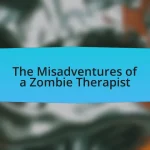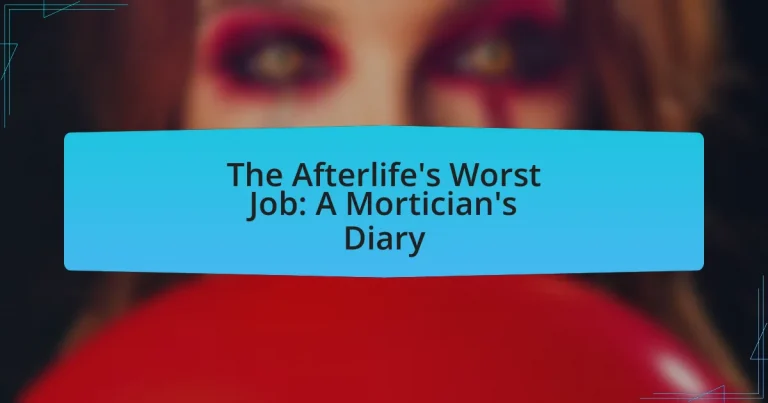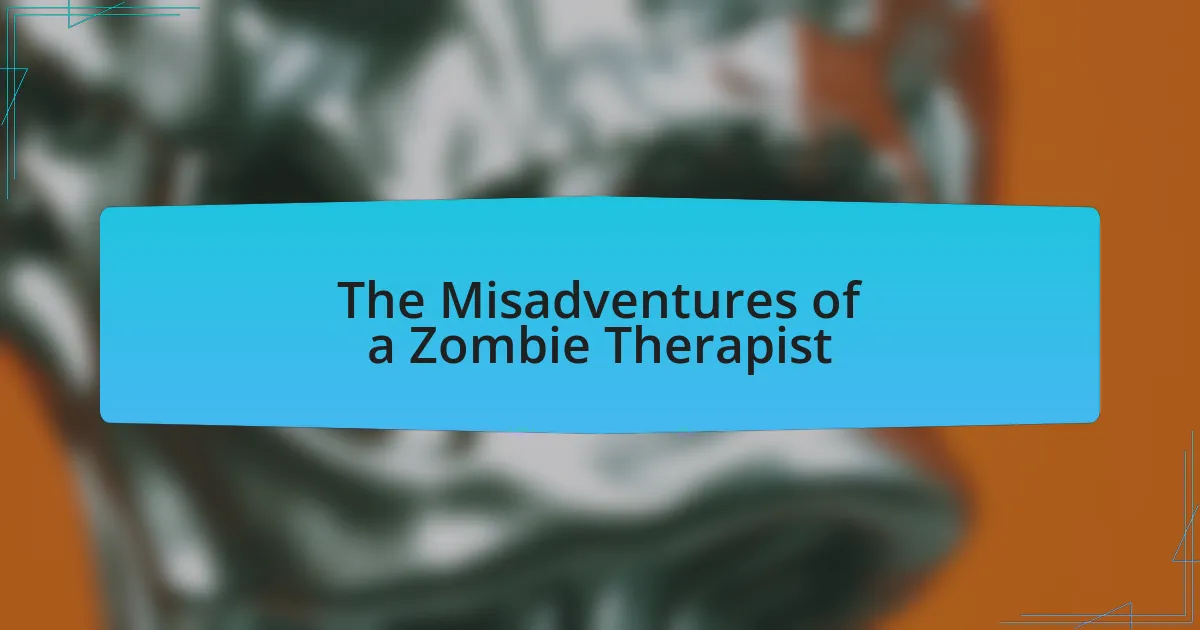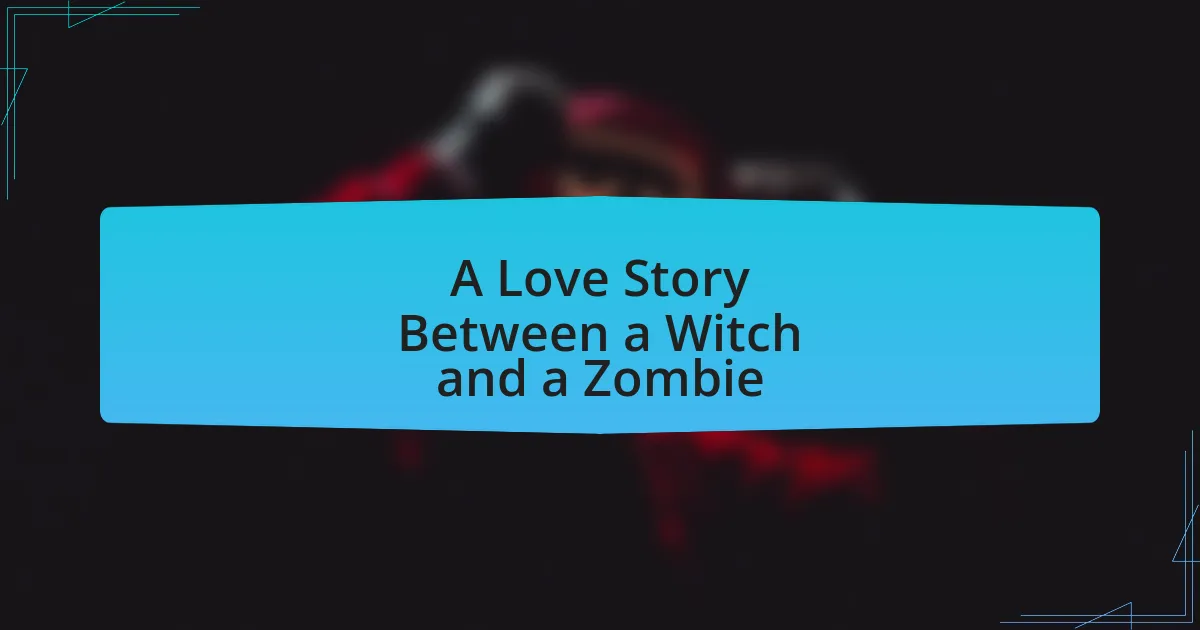The article “The Afterlife’s Worst Job: A Mortician’s Diary” explores the role and responsibilities of morticians, emphasizing their work in preparing deceased individuals for burial or cremation and supporting grieving families. It highlights the unique challenges faced by morticians, including emotional tolls, misconceptions about their profession, and the essential skills required for success. The article also discusses the importance of mortuary science in public health and safety, the educational pathways to becoming a mortician, and the coping strategies employed to manage the stresses of the job. Through personal stories and insights, it sheds light on the complexities of dealing with death and the societal attitudes surrounding it.
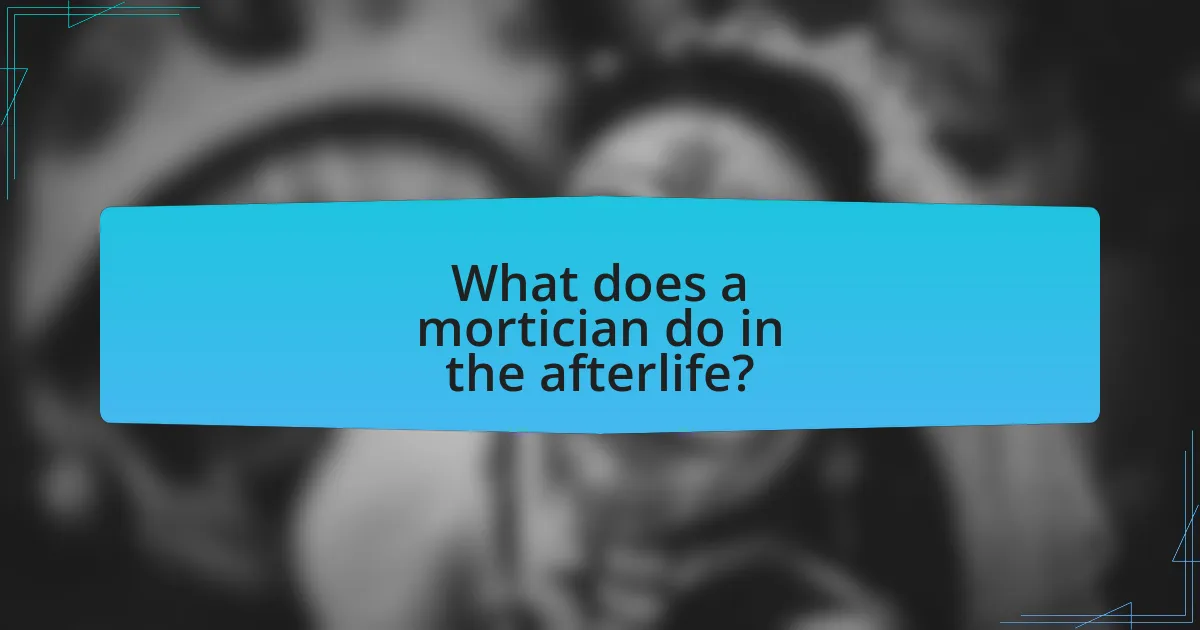
What does a mortician do in the afterlife?
A mortician does not have a role in the afterlife, as their work is confined to the preparation and handling of deceased individuals before burial or cremation. Morticians, also known as funeral directors, focus on tasks such as embalming, arranging funerals, and providing support to grieving families, all of which occur in the physical realm. The concept of an afterlife does not involve morticians performing any duties, as their responsibilities are strictly related to the care of the deceased in this life.
How does the role of a mortician differ from other professions?
The role of a mortician differs from other professions primarily in its focus on death care and the management of funerary services. Morticians are responsible for preparing deceased bodies for burial or cremation, which includes embalming, dressing, and casketing, tasks that are unique to this profession. Unlike healthcare providers who focus on preserving life, morticians deal with the end of life, providing services that help families navigate grief and loss. This profession also requires specialized knowledge of legal regulations regarding death, which is not typically a requirement in most other fields.
What specific tasks are involved in a mortician’s daily routine?
A mortician’s daily routine involves several specific tasks, including preparing bodies for burial or cremation, conducting embalming procedures, and arranging funeral services. Morticians also meet with grieving families to discuss their needs, complete necessary paperwork, and ensure compliance with legal regulations. Additionally, they maintain the funeral home, manage inventory of supplies, and may provide grief support to families. These tasks are essential for facilitating the final arrangements and honoring the deceased, reflecting the mortician’s role in the funeral industry.
How do morticians prepare bodies for burial or cremation?
Morticians prepare bodies for burial or cremation through a series of systematic procedures. Initially, they perform embalming, which involves the injection of a formaldehyde-based solution to preserve the body and delay decomposition. This process also includes the cleaning and sanitizing of the body, as well as the closure of any incisions made during embalming.
Following embalming, morticians may dress the body in clothing chosen by the family and apply cosmetics to enhance the appearance for viewing. For cremation, the body is placed in a cremation container, which is typically made of combustible materials. Morticians ensure that all personal items are removed and that the body is prepared according to legal and ethical standards.
These practices are guided by regulations and industry standards, ensuring respect and dignity for the deceased.
Why is the work of a mortician considered challenging?
The work of a mortician is considered challenging due to the emotional and psychological demands of dealing with death and grieving families. Morticians must navigate complex emotions while providing support and guidance to bereaved individuals, often in high-stress situations. Additionally, the technical aspects of embalming, body preparation, and adherence to legal regulations add layers of complexity to the role. According to the National Funeral Directors Association, the profession requires a unique blend of compassion, resilience, and technical skill, making it one of the more demanding careers in the service industry.
What emotional toll does working as a mortician take on individuals?
Working as a mortician takes a significant emotional toll on individuals, often leading to chronic stress, compassion fatigue, and feelings of isolation. Morticians regularly confront death and grief, which can result in emotional exhaustion and desensitization over time. Studies indicate that professionals in this field may experience higher rates of depression and anxiety compared to other occupations due to the constant exposure to loss and the need to support grieving families. Additionally, the societal stigma surrounding death can contribute to feelings of loneliness, as morticians may find it challenging to discuss their experiences with others who do not share their profession.
How do morticians cope with the stress of their job?
Morticians cope with the stress of their job through various strategies, including emotional detachment, support networks, and self-care practices. Emotional detachment allows morticians to manage their feelings about death and grieving families, enabling them to perform their duties effectively. Support networks, such as colleagues and professional organizations, provide a space for sharing experiences and coping strategies, which can alleviate feelings of isolation. Additionally, self-care practices like exercise, hobbies, and counseling help morticians maintain their mental health and resilience in a demanding profession. These coping mechanisms are essential, as studies indicate that professionals in high-stress occupations, including morticians, are at risk for burnout and mental health issues.
What insights can be gained from a mortician’s diary?
A mortician’s diary provides insights into the emotional and psychological aspects of death, the grieving process, and the rituals surrounding funerals. These diaries often reveal the personal reflections of morticians on their experiences with bereaved families, highlighting the complexities of human emotions during times of loss. Additionally, they may document the technical aspects of embalming and body preparation, offering a glimpse into the profession’s challenges and ethical considerations. Such diaries can also reflect societal attitudes toward death and dying, illustrating how cultural practices influence the mortuary profession.
What personal stories and experiences are commonly shared in a mortician’s diary?
Personal stories and experiences commonly shared in a mortician’s diary include reflections on the emotional impact of working with grieving families, anecdotes about unique or unusual cases, and insights into the rituals and customs surrounding death. Morticians often document their interactions with bereaved individuals, highlighting the profound connections formed during the process of helping families cope with loss. Additionally, they may recount specific instances that challenged their professional skills or emotional resilience, such as handling unexpected situations during funerals or managing the logistics of complex arrangements. These narratives serve to illustrate the complexities of the mortician’s role and the human experiences intertwined with death and mourning.
How do these stories reflect societal attitudes towards death?
These stories reflect societal attitudes towards death by illustrating the complex emotions and cultural practices surrounding mortality. They reveal a tendency to both fear and romanticize death, showcasing how individuals grapple with loss while also seeking meaning in the process of dying. For instance, the narratives often highlight rituals and customs that signify respect for the deceased, indicating a societal recognition of death as a significant life event. Additionally, the portrayal of morticians as both caretakers and witnesses to human fragility underscores a societal acknowledgment of the inevitability of death, prompting reflections on legacy and remembrance. Such themes are evident in various cultures, where literature and personal accounts often serve to normalize discussions about death, thereby influencing public perceptions and attitudes.
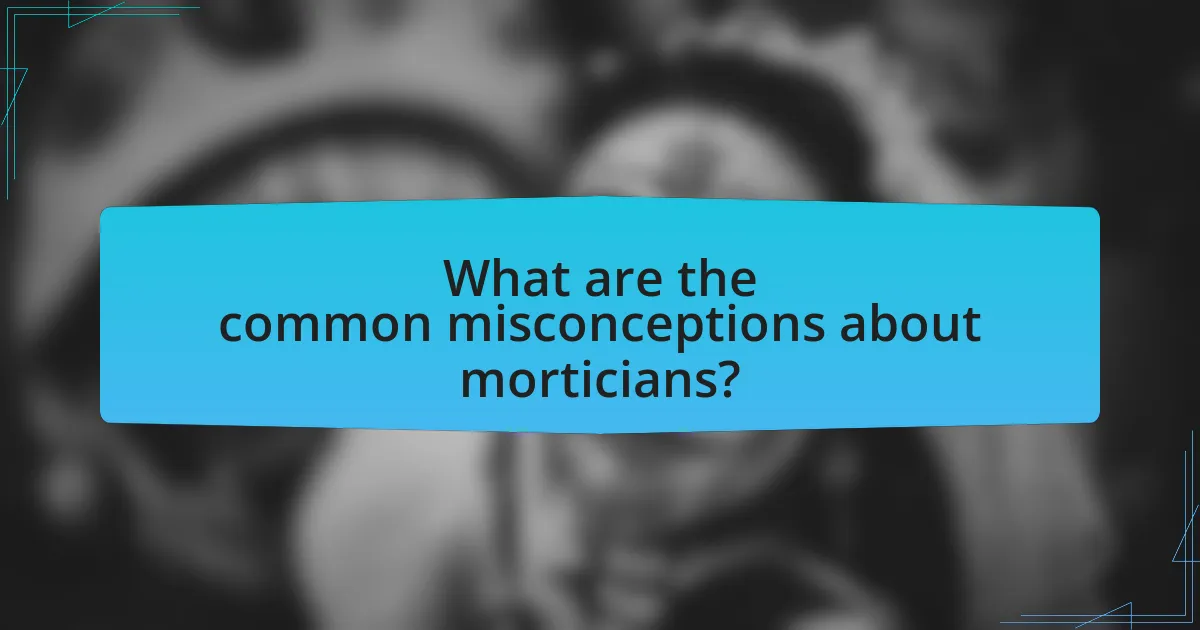
What are the common misconceptions about morticians?
Common misconceptions about morticians include the belief that they are morbid or emotionally detached individuals. In reality, morticians, also known as funeral directors, often possess strong empathy and compassion, as they provide support to grieving families during difficult times. Another misconception is that morticians only deal with dead bodies; however, their responsibilities also encompass planning funerals, managing logistics, and offering bereavement counseling. Additionally, many people think that morticians work in isolation, but they frequently collaborate with other professionals, such as medical examiners and grief counselors, to ensure comprehensive care for the deceased and their families. These misconceptions can stem from media portrayals and societal attitudes towards death, which often emphasize fear and negativity rather than the supportive role that morticians play in the grieving process.
How do media portrayals of morticians differ from reality?
Media portrayals of morticians often depict them as eccentric, morbid, or emotionally detached individuals, which contrasts sharply with the reality of their profession. In reality, morticians are trained professionals who provide compassionate care to grieving families, focusing on the logistics of funeral services and the respectful handling of deceased individuals. Research indicates that the portrayal of morticians in films and television often exaggerates their quirks and detachment, while studies show that most morticians prioritize empathy and support for families during difficult times. For instance, a survey conducted by the National Funeral Directors Association revealed that 90% of funeral directors consider their role as a service to the community, emphasizing the importance of emotional support rather than the sensationalized depictions often seen in media.
What are some stereotypes associated with morticians?
Morticians are often stereotyped as being morbid, socially awkward, and emotionally detached individuals. These stereotypes stem from the perception that morticians work exclusively with death and the deceased, leading to assumptions about their personalities and lifestyles. For instance, popular media frequently portrays morticians as darkly humorous or overly serious, reinforcing the idea that they are uncomfortable with life and death. Additionally, there is a stereotype that morticians are obsessed with the macabre, which can overshadow the reality that many are compassionate professionals dedicated to helping families through difficult times.
How do morticians address these misconceptions in their work?
Morticians address misconceptions in their work by providing education and transparency about their practices. They often engage with the public through community outreach programs, workshops, and social media to demystify the funeral process and clarify the role of a mortician. For example, morticians explain the importance of embalming, the handling of remains, and the various services offered, which helps to dispel myths surrounding death care. Additionally, they may share personal stories and experiences to humanize their profession, thereby fostering a better understanding of the emotional and logistical aspects of their work. This proactive approach not only corrects misunderstandings but also builds trust within the communities they serve.
Why is the profession of mortuary science important?
The profession of mortuary science is important because it plays a crucial role in helping families navigate the grieving process and ensuring the respectful handling of deceased individuals. Mortuary science professionals provide essential services such as embalming, cremation, and funeral planning, which facilitate closure for bereaved families. According to the National Funeral Directors Association, over 2.4 million deaths occur annually in the United States, highlighting the significant demand for skilled morticians who can manage these sensitive situations with care and professionalism.
What role do morticians play in the grieving process for families?
Morticians play a crucial role in the grieving process for families by providing essential services that facilitate the transition from life to death. They help families navigate the complexities of funeral arrangements, including body preparation, transportation, and legal documentation, which allows grieving individuals to focus on their emotional healing rather than logistical burdens. Morticians also offer emotional support and guidance, often serving as a compassionate presence during a difficult time, which can significantly aid in the grieving process. Their expertise in handling the deceased with dignity and respect reassures families, fostering a sense of closure and honoring the memory of their loved ones.
How do morticians contribute to public health and safety?
Morticians contribute to public health and safety by ensuring the proper handling and disposal of deceased bodies, which prevents the spread of infectious diseases. They follow strict sanitation protocols and legal regulations to manage remains, thereby minimizing health risks associated with decomposition and potential pathogens. For instance, the Centers for Disease Control and Prevention (CDC) emphasizes the importance of proper embalming and burial practices to control disease transmission. Additionally, morticians provide essential services such as death certification, which aids in public health data collection and monitoring mortality trends, further supporting community health initiatives.
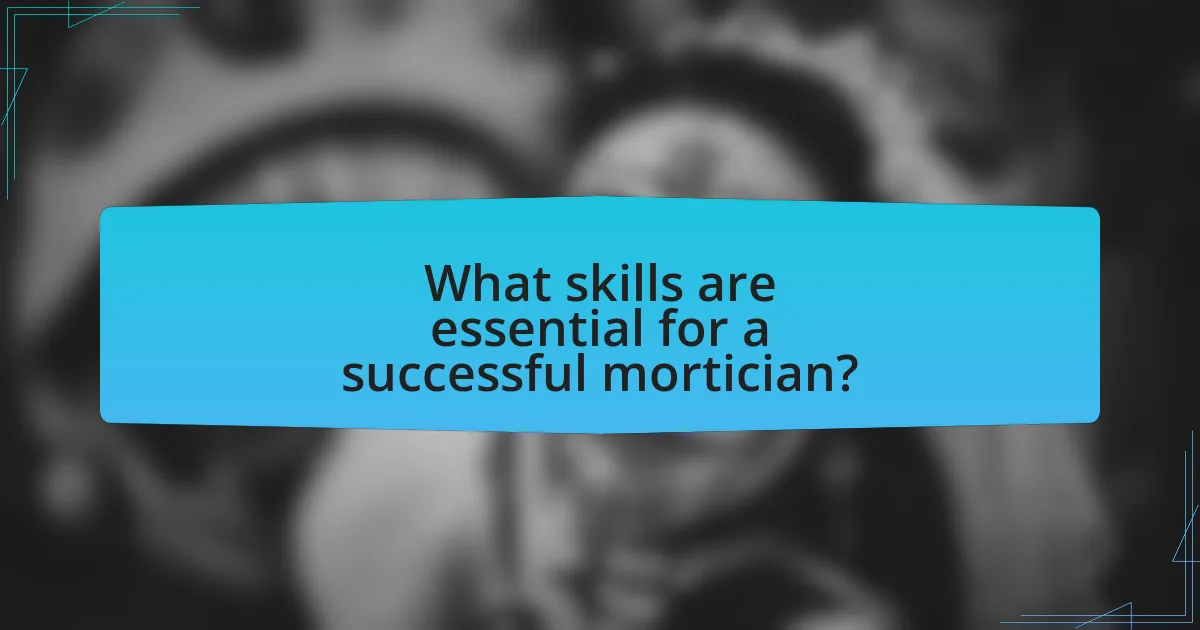
What skills are essential for a successful mortician?
Essential skills for a successful mortician include strong communication, empathy, attention to detail, and organizational abilities. Communication skills are vital for interacting with grieving families and explaining funeral arrangements clearly. Empathy allows morticians to provide compassionate support during difficult times. Attention to detail is crucial for handling the deceased with care and ensuring all legal and procedural requirements are met. Organizational skills help manage multiple tasks, such as scheduling services and maintaining records accurately. These skills collectively enable morticians to perform their duties effectively and sensitively in a challenging profession.
What educational background is required to become a mortician?
To become a mortician, an individual typically needs an associate’s degree in mortuary science. This degree program includes coursework in anatomy, embalming, and funeral service management. Additionally, most states require morticians to obtain a license, which involves completing an accredited program, passing a national board exam, and fulfilling an internship or apprenticeship. According to the American Board of Funeral Service Education, accredited mortuary science programs ensure that graduates meet the educational standards necessary for licensure and practice in the field.
What specific training do morticians undergo?
Morticians undergo specific training that typically includes completing an accredited mortuary science program, which usually requires an associate’s degree. This program covers essential subjects such as embalming, restorative art, funeral service management, and grief counseling. Additionally, morticians must complete a supervised apprenticeship, often lasting one to three years, to gain practical experience in the field. Furthermore, they are required to pass a national board examination and obtain state licensure to practice legally. This structured training ensures that morticians are equipped with the necessary skills and knowledge to handle the complexities of their profession.
How do continuing education and certifications impact a mortician’s career?
Continuing education and certifications significantly enhance a mortician’s career by improving their knowledge, skills, and marketability. Morticians who pursue ongoing education stay updated on industry standards, legal regulations, and advancements in embalming and restorative techniques, which are crucial for providing high-quality services. For instance, the National Funeral Directors Association (NFDA) emphasizes that licensed funeral directors must complete continuing education to maintain their licenses, ensuring they meet current professional standards. Additionally, obtaining specialized certifications, such as those in grief counseling or cremation, can differentiate morticians in a competitive job market, leading to increased job opportunities and potentially higher salaries.
What personal qualities make a great mortician?
A great mortician possesses empathy, attention to detail, and strong communication skills. Empathy allows morticians to connect with grieving families, providing them with comfort and support during difficult times. Attention to detail is crucial for ensuring that all aspects of the deceased’s care and the funeral arrangements are handled meticulously, which is essential for maintaining professionalism and respect. Strong communication skills enable morticians to effectively convey information and coordinate with families, staff, and other professionals involved in the process. These qualities are vital for fostering trust and delivering compassionate service in a sensitive profession.
How does empathy play a role in a mortician’s effectiveness?
Empathy significantly enhances a mortician’s effectiveness by enabling them to connect with grieving families on a personal level. This emotional connection fosters trust and comfort, which are crucial during the difficult process of arranging a loved one’s funeral. Research indicates that morticians who demonstrate empathy can better understand the needs and wishes of the bereaved, leading to more personalized and meaningful services. For instance, a study published in the Journal of Death and Dying highlights that empathetic communication improves client satisfaction and helps families navigate their grief more effectively. Thus, empathy is not just a soft skill; it is a vital component that directly impacts the quality of care and service provided by morticians.
What communication skills are necessary for morticians when dealing with families?
Morticians require strong empathetic listening, clear verbal communication, and non-verbal communication skills when dealing with families. Empathetic listening allows morticians to understand the emotional needs of grieving families, fostering trust and connection. Clear verbal communication is essential for conveying information about funeral arrangements, legal requirements, and available services in a straightforward manner. Non-verbal communication, such as maintaining eye contact and appropriate body language, helps convey compassion and support during difficult conversations. These skills are crucial in ensuring families feel heard, respected, and supported during their time of loss.
What practical tips can aspiring morticians consider?
Aspiring morticians should focus on gaining relevant education and hands-on experience in mortuary science. Enrolling in an accredited mortuary science program provides foundational knowledge in anatomy, embalming, and funeral service management. Additionally, securing internships or apprenticeships at funeral homes allows for practical application of skills and understanding of the profession’s daily operations. Networking with professionals in the field can also provide mentorship opportunities and insights into industry standards. According to the American Board of Funeral Service Education, completing a program accredited by them is essential for licensure in most states, reinforcing the importance of formal education in this career path.
How can one prepare for the emotional challenges of being a mortician?
To prepare for the emotional challenges of being a mortician, individuals should engage in self-care practices, seek professional counseling, and develop strong support networks. Self-care practices, such as mindfulness and stress management techniques, help morticians cope with the emotional toll of their work. Professional counseling provides a safe space to process grief and trauma, which is essential given that studies indicate morticians often experience higher levels of stress and burnout compared to other professions. Additionally, building a support network of colleagues and friends allows morticians to share experiences and feelings, fostering resilience and emotional well-being.
What resources are available for those interested in pursuing a career in mortuary science?
Resources available for those interested in pursuing a career in mortuary science include accredited educational programs, professional organizations, and state licensing boards. Accredited programs, such as those offered by community colleges and universities, provide essential coursework in anatomy, embalming, and funeral service management. Professional organizations like the National Funeral Directors Association (NFDA) and the American Board of Funeral Service Education (ABFSE) offer networking opportunities, continuing education, and industry standards. Additionally, state licensing boards provide information on the requirements for licensure, which typically include completing an accredited program and passing a national exam. These resources collectively support individuals in gaining the necessary education, skills, and credentials for a successful career in mortuary science.





